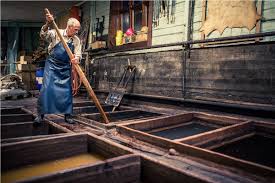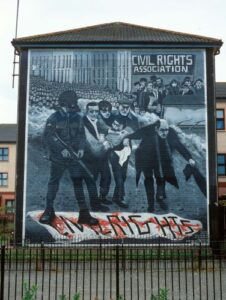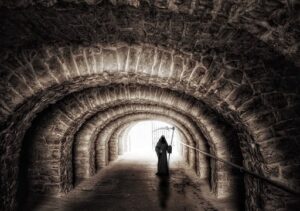I have just watched Dr Paul Kelly, Australia’s Chief Medical Officer, again on television this week. As we stagger out of this two year spotlight on this bloody virus, Australia will eventually realise how much it owes to this guy, whose calmness among the brouhaha of scientific advice has always known where the horizon is. I hope he can pass on this undoubted skill in his stewardship of public health.
Nowhere to Hide in Unalloyed Comfort

I was reading a text about pollution of a river in Brazil, the Rio Tiete, which runs through São Paulo, and is very polluted in places. One of the words even my young language teacher was unfamiliar with was “curtumes” – the word for tanneries.
I thought how familiar would the average young punter be with the word tannery. There would be some who might believe a tannery is where you go to lie on a tanning bed and stimulate the growth of your malignant melanomas.
How many young people would know what a tannery is?
Tanning animal hides was undertaken as far back as Neanderthal man, and involves turning animal hides, particularly deer, into leather. Neanderthal man learnt to soften the hides by recognising the efficacy of animal fat, particularly bear, as well as bone marrow and brain. Thus, tanning has always been a messy business. Surplus skin was boiled together with other animal parts into glue. A totally unpleasant process perpetuated for eons.
However, in the city of my youth, if there was a distinctive unpleasant smell, generally there would be an abattoir around. Tanning hides also involves the use of arsenic, formaldehyde and other pollutants that used to be dumped in a nearby river.
The importance of leather was never more emphasised to me than in the following anecdote. I remember some years ago a vegan said the only animal product for which he, the vegan, had not found an adequate substitute was shoe leather. However, today it seems mushroom mycelia, banana and pineapple leaves, paper and cork are apparently now favoured as plasticised replacements. The petrochemical industry seems to have pushed the tannery aside.
As a result of all the pressures, there are few tanneries left in this country and the export market for hides has fallen away over the past decade. China, as it does with most polluting industries, leads in tanning, but the biggest exporter of leather is Italy. It was the link through the leather trade (China to Italy) that facilitated COVID-19’s invasion of Europe via Chinese leather workers who had been brought in to work on the production of shoes and other leather accessories in Northern Italy – and the rest is history.
The tannery is a declining industry; but the stannary represents an even more distant industry. My ancestors came from one of three stannary towns in Devon – Ashburton. This place name is my great-grandparent’s headstone. Tin was first mined in Mesopotamia and there is much speculation as to the origin of tin mining. The history books assure us the Ascent of Humankind passed from stone to bronze age, which means that tin was a very early metal discovered and used, alloyed with copper to form bronze.
An extensive examination of tin mining in Cornwall and Devon, published in 1908, summed up the plight of the stannary: The smelters are still at the present day the purchasers of the ore of the stannaries, and the antiquated and in some respects apparently unjust business relations between smelter and tinner are responsible for a share of the depression which has rested for a number of years on the tin mines of Cornwall.
The stannary, even in primitive form, was where tin was smelted and thus had played an important part of our early ancestors’ existence. Here, for many centuries, Devon and Cornwall were extremely important revenue producing vehicles, and it is not by chance that the Prince of Wales holds the purse strings of the Duchy of Cornwall. The towns, both in Devon and Cornwall, where the most important centres of tin mining were located; they were called Stannary Towns, a quaint appellation that still exists today. We are reminded of them by the increasing number of minor celebrities who ramble around Britain in TV docos – the remains of tin mining in these two counties always scores a mention.

As for stannary, well it apparently comes from a Cornish word “steyn”, corrupted from the Latin word “stannum”. It should be noted that although we have one of the largest underground tin mines in the world on the West Coast of Tasmania, there are no stannaries, or re-named as tin smelters, in Australia. Our stannic concentrates have to be shipped to Indonesia, Malaysia – and, wait for it, China – to be refined. China has the largest tin deposits in the world, in an industry which, a decade or so ago, was nearly destroyed by the formation of an unsustainable cartel.
So, what’s in a name – tannery or stannary? Progress?
The Premier Pirouette
Pirouettes may be executed singly or as multiple rotations; the latter is commonly performed in the adagio part of a grand pas de deux.
There are many variations of pirouettes.
Watching the flourish of the new NSW Premier with the curious name is to watch an anarchist without the black flag. Unlike that anarchic atavar Tolstoy, he may not yet believe that following the teachings of Jesus and practising non-violence would lead to the collapse of the state and the capitalist economy, but perhaps he would subscribe to the first part.
Now an anarchic mind at work. I applaud his decision to abandon hotel quarantine.
Hotel quarantine was a stratagem to tide the hotel industry over during the pandemic, but it has lasted longer than expected and the longer the hotel quarantine has been used, the more its frailty has emerged. Only the decision to limit to a dribble the number of people coming to Australia has masked the inadequacy of hotel quarantine.
I applaud his decision to abandon sign language at media conferences. This American import is a means of communication for less than 20,000. For many viewers, it is irritating pantomime, and there is the particularly objectionable sight at Queensland Government press conference where this hulking figure overpowers the conference with his flamboyant gesturing. Just read the subtitles.
I believe that the NSW Premier’s decision to open the borders is consistent with this anarchic progress; but we shall see. The border closure has been peppered with such phrases as “fortress” and “freedom” and “hermit” and the jargon of follow-the-leader journalism”, all words within the anarchist’s lexicon.
As one anarchist has written, freedom is a slippery character. Individual freedoms are tempered by exercising the freedom of one’s will over that of others. Here anarchy of individual freedom runs up against the authoritarian view of imposing their definition of freedom on others. Here the Pirouette, while mouthing the desire to ensure that no one can use institutional structures to deny individual freedoms, exercises absolute authority.

He has pirouetted away from the public health physicians as his soothsayers. He perceives their academic, often contradictory discourse is increasingly bamboozling the healthy illiterate. The Chief Health Officer now may read the daily COVID figures as though she were reading the Landline weather report, without any media one day and then let loose with her own media conference on another day.
It was interesting to see the Governor-elect of Queensland, in response to the NSW announcement of opening of international borders, shrilly shroud-waving for perhaps the last time. Everybody in Queensland will get the Virus was her dire prediction. For the Queensland Premier, everybody will get vaccinated; something the departing Chief Health Officer has left in her “To Do” basket.
The danger in all this pirouetting is that the importance of public health maybe downgraded. Fortunately, if the media loses interest in providing all and sundry with a microphone, Australia will settle down.
The importance of therapeutic agents has meant that Australia is creating a backup drug stockpile – the efficacy of their actions presumably titrated against the actual need (rather than that of the pharmaceutical companies needing to flog these cures), cost and ease of administration.
The therapeutic agents are no replacement for vaccination. The danger of this approach is exemplified by a well-to-do architect, unvaccinated as is the Texan way, who contracted a severe form of the Virus and was treated by a cocktail of these drugs and survived. He had been very sick and was now, at the time of interview, recovered and considering whether he should be vaccinated. Still ambivalent, despite the severity of his disease.
The problem, as pointed out to him, was that these drugs may assist your recovery from one infection, but they do not prevent you from succumbing to the Virus again. Even having recovered from COVID-19, vaccination is still the ideal choice since it provides a significant boost to antibody levels and hence a more consistent immunity.
Fortunately, we do not have any of our leaders beholden to Trump, and so vaccination hesitancy is not a component of our recovery. Nevertheless, the introduction of drugs which do work should assist in pushing aside the quackery as exemplified by advocacy of hydroxychloroquine, ivermectin and zinc.
The ongoing problem is the requirement for suitable quarantine facilities although this raises the whole question of the number of quarantine places needed, especially if home quarantine is found wanting. The facilities in Victoria and Queensland are being constructed. They will be built in order to reduce the claustrophobia of the current hotel quarantine. At the same time, access to open air should be much better than the artificiality and variability of air conditioned environments.
These facilities provide a reserve power for each State where quarantine is still required. After all, the troubling yet not unexpected appearance of a variant on the Delta variant reinforces the need for such facilities now and into the future.
Five rapid antigen tests (two saliva and three nasal) have been approved by the TGA for use from 1 November (although with no information yet about how they may be used). Rapid antigen tests are already being used in a variety of settings, including aged care facilities, for film and TV production and at the Howard Springs quarantine facility when it was run by the Commonwealth government. Responsible use of these testing kits (meaning you don’t hide positive tests) will assist in quarantine and the ability to travel in accord with the rules being imposed by the various State jurisdictions. That’s the theory anyway.
Such an approach works when there is a sense of responsibility and not the selfishness and ignorance, particularly rampant among that cohort of young men with a high level of these two qualities. Youth is bullet proof until death occurs, and then there is the spectacle of tears and flowers and roadside crosses – until the bulletproof vest of youth corrodes with age. Then it is government’s responsibility to pick up the pieces.
Until the sense of community responsibility evens out, then the community must have quarantine facilities to provide a place to curb this restlessness and self-indulgence. I wonder whether anybody in the youthful NSW government has thought this requirement through.
There are other problems, the first is how to deal with waning immunity. This is the next frontier. Fortunately, the question of the appropriate time for a booster after double dose vaccination, is being addressed and appears to have been agreed as six months.
In the long term, any time less than a year for a booster will become tiresome. The whole inconvenience of being vaccinated in the first place may have been overcome for now. Regular vaccination should become part of assuring the public health of the community. The addition of boosters should continue the same mixture of incentives, including fear, which have shown to be successful in the current rate of vaccination in Australia, although maintaining the 80-90 per cent vaccination rate beyond this year will be a significant challenge – hence, the current discussion about retaining mandated vaccination.
Similarly, there is consideration of immunisation for children from five years to 12 years; what is the plan if the Pfizer application is approved by the FDA in America? Does the Therapeutic Goods Administration then provide approval without delay, followed by the blessing of ATAGI? In other words, there are strands of policy coursing through the veins of the Commonwealth Health Department, without any obvious connection to the various State’s programs on vaccination rates, as though that is the end point rather than an important interim stage.
The main problem with pirouetting, it does not necessarily mean progress, however extravagant, graceful and flamboyant. And once the pirouetting stops then what is next for the unresolved challenges broached above.
It did not take long for the pirouette to resume. At the end of the week, I have been confounded and am now agog – the proposal for funding towards the manufacture of mRNA vaccines in NSW. Just out of the Ether?
Building Links in Northern Ireland is better without Bunkers
Let them and me repose in obscurity and peace, and my tomb remain uninscribed, until other times, and other men, can do justice to my character; when my country takes her place among the nations of the earth, then, and not till then, let my epitaph be written. I have done. – Robert Emmet from the Dock 1803.
To me, it will always be Derry. I remember walking the ramparts of Derry, being watched by security cameras. It was one of those drizzly grey days – the ramparts are grey and the view over Derry is grey, except for the wall murals, the futurist slashes of colour, the stark black and white merging in the greyness of Bloody Sunday. This is the tapestry of the Troubles. I was here well after the 1998 Good Friday Agreement had brought an uneasy truce to Northern Ireland.

Walking round, overlooking the Bogside, here was I, an Irish Nationalist sympathiser who had never had the courage of my convictions to ever voice them. Like myself, Robert Emmet was not a Roman Catholic but passionate about the Irish being a free nation, even with all its gross imperfections. At various stages, I have thought about obtaining Irish citizenship, because my grandfather was born in Ireland, which made me eligible. In the end, although I have sung the Irish national anthem many times, you can only owe allegiance to one country, and that – for better or for worse – is Australia.
My first encounter with The Troubles was in the eighties when I travelled across the border from Donegal into Fermanagh to the border town of Belleek, famous for its porcelain. Crossing the border I passed by these sentry boxes manned by British troops. I showed my passport and was asked what I was doing. “Tourist” can be difficult to sustain as an excuse, given that I was driving an uncommon route for tourists and, as I learnt later, this was a road used by the IRA to travel between the two countries.
Belleek porcelain is not to my taste. Wandering around the factory was interesting. It was only later when I drove down the deserted road after leaving Belleek, with Lough Erne below, that I started to feel distinctly uneasy. Even though the clouds were low, the view was superb. Despite the niggling anxiety, I stopped to take photos, and every time I did so, I had this feeling of being watched. Yet, looking around, there was nothing to see.
Even then, the roads in Northern Ireland were far better than on the other side of the border. It is strange that I noticed this, but I needed to pass through Enniskillen. I remembered I filled up the petrol tank here. As I recall, it was the time between the first and second Enniskillen bomb attacks. On each occasion many were killed, both soldiers and civilians. Needless to say, I did not take in the sights of Enniskillen.
I suppose looking back, I was glad to find refuge over the border back in the Republic in Co Cavan, where I stopped to buy Cavan crystal glasses and a crystal bear. I had traversed Co Fermanagh and nothing had happened, but then most of the time nothing does happen. Nevertheless, there is always the apprehension that something may happen, even when you are sympathetic, as I have been, even siding with the Republican cause. Yet irrespective of my sympathies if it had been the IRA operatives who stopped me on the road, demanding to know my business – they would have, in all probability, enacted their version of Jedburgh justice – shoot me first, try me later.
But then there was a still small voice, which said, “pull yourself together, don’t be so dramatic, boyo, you’re not on the stage of the Abbey Theatre.”
Donald Trump’s Bizarre Obsession
In 2016, presidential candidate Trump challenged a critic, Mayor Sadiq Khan of London: “Let’s do an IQ test,” as if intelligence testing were a board game, or an arm wrestling match.
Lately, Trump has been tossing around his crazy epithet “low IQ,” as in “very low-IQ individual Robert De Niro” or “low-IQ Mika Brzezinski.” I wonder if anyone other than De Niro’s mother has ever fretted about her son’s being “mentally” challenged. He’s a great actor; does he need great board scores too?
Trump is not the first politician to ply these waters. In 1987, then-Presidential candidate Joe Biden lashed out at a questioner, saying, “I think I have a much higher I.Q. than you do.” Biden then proceeded to make Trumpian, i.e. false, claims about finishing in the top half of his law school class.
I suppose most people want to be thought of as intelligent, and we know Trump is manically insecure about almost everything. Anyone who has to boast that he is “really smart” and “a very stable genius” calls attention to his intellectual vulnerability.
Why? There’s no evidence that Trump is an idiot; indeed, quite the contrary. He’s obviously lazy, preferring the intellectual slurry of television to the written word. He may have suffered the expected mental erosion of a 72-year-old (Sic)*, but he’s not slow.
*Trump was born in 1946 and thus is 75.
This above extract from The Boston Globe was somewhat ruminative; it is as though one of the senior staff at The Boston Globe had a space to fill and wrote this piece, while at the same time reminding us of Biden’s mental frailty (a situation which has always troubled me).
The analysis of Trump reminds us of the fact that mental deterioration afflicts everybody to some degree, and whether IQ is a valid measurement or not when you age; it is still there to check some level of functioning. As such it may give some solace to Trump if he wanted to demonstrate his mental prowess.
Trump is such a narcissistic personality that I doubt that he would submit himself to an IQ test. Even if he did and the test did not validate his boast, then he would say that those administering the test had falsified the results or stolen his brain or anything that came into the confabulating gap in his 75 year old cerebrum.
 I did an online IQ test, finishing the 20 questions well within the allotted time. My score was 108. So, I am just average Giacomo, but I do have visual perception in the top one per cent. That’s great because I can perceive the light at the end of the tunnel as that hooded chap with a sickle waving a lantern. The problem is that I am not smart enough to calculate the length of the tunnel.
I did an online IQ test, finishing the 20 questions well within the allotted time. My score was 108. So, I am just average Giacomo, but I do have visual perception in the top one per cent. That’s great because I can perceive the light at the end of the tunnel as that hooded chap with a sickle waving a lantern. The problem is that I am not smart enough to calculate the length of the tunnel.
Mouse Whisper
A Liverpool merchant called John Bellingham shot dead the UK Prime Minister, Spencer Perceval, in the halls of the Houses of Parliament on 11 May 1812. Bellingham was summarily executed a week later at Newgate Prison.
As written, after Perceval’s death, the Parliament made generous provisions for his widow and children and approved the erection of a monument in Westminster Abbey.
Thereafter his ministry was soon forgotten, his policies reversed; there was no hand wringing by Parliamentarians and consequent acts of government to enhance security to further alienate their constituents by the erection of portcullises and attendance by armed guards. He was, after all, the Prime Minister when there was not a hungry security industry to feed and community fear to be cynically provoked.
As for us rodents, Mouseilini was the last of ours to be drowned in a vat of warfarin – or rather in a rat sack.

